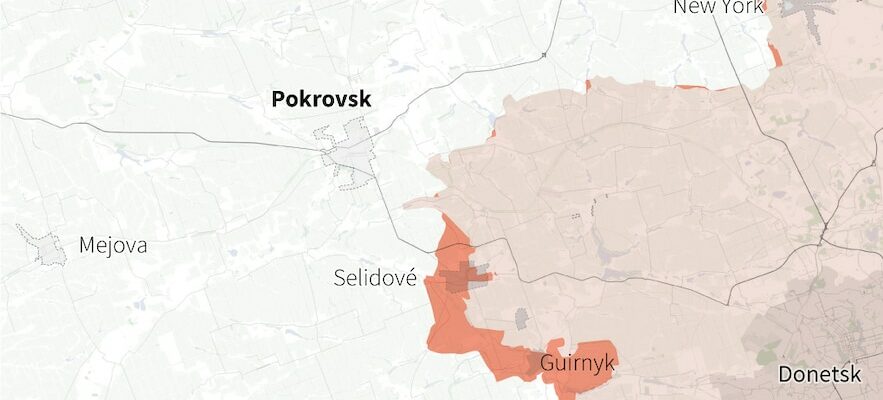The lines are moving in eastern Ukraine. And particularly in the region of Donbassconsidered the “priority” of Russian President Vladimir Putin. This Thursday, October 31, it was the village of Yasna Polyana which fell into the hands of the Kremlin army, with the Russian Interior Ministry speaking – unsurprisingly – of a “liberation”. A few days earlier, about twenty kilometers to the northwest, the town of Vougledar suffered the same fate. And still in eastern Ukraine, the industrial city of Kurakhové, 3,000 inhabitants, now observes the Russian army at its gates.
All of these towns and villages were strategic anchor points for Ukrainian defenses in the region. “These gains, among the fastest of the war, will help the Russian army secure its flanks before launching an assault on the city of Pokrovsk, a key logistical hub for Ukrainian forces in the Donbass,” underlines the American daily , The New York Times. Russian troops are now located approximately 6 kilometers from this urban center.
Despite Russian advances, Ukrainian soldiers continue to hold the front line.
© / AFP
Since the beginning of October, Vladimir Putin’s army has advanced 478 km² into Ukrainian territory. This is its largest territorial gain over a month since March 2022 and the first weeks of the war, according to an AFP analysis published Monday October 28, based on data from the American Institute for the Study of War (ISW). Two thirds of this progress, or 324 km², was made in the Donetsk oblast. “The Armed Forces of the Russian Federation (FAFR) continue their strategy of territorial nibbling and continue their daily strikes in the depths of Ukraine, targeting in particular energy infrastructure and residential areas,” commented on the social network this Thursday, the Ministry of the Armed Forces and Veterans Affairs.
Ukrainian soldiers exhausted
These Russian advances represent a striking change from last year. At this time, the front lines remained almost static, despite ambitious offensives from both sides. L‘ISW recalls, however, that the current rate of progress remains “consistent with a war of position”, that is to say “slow”. And the upcoming arrival of winter should not disrupt this observation. “Tactical movements will become much more complicated in the weeks to come, while waiting for the cold to set in. The Russians will then only advance a few kilometers, here and there,” anticipates in the columns of The Dispatch General Jérôme Pellistrandi, editor-in-chief of the magazine National Defense.
Opposite, the Ukrainian forces are struggling, fewer in number and less well armed than their enemies. They are in such demand that it is difficult for them to hold certain positions. While Volodymyr Zelensky recently announced the mobilization of 160,000 new people to fill his army, other elements explain the Kremlin’s shrinking. “There is the increased use of powerful guided bombs, capable of destroying fortified enemy positions, and the lack of Ukrainian fortifications in the area where Russia is located,” list in the New York Times Vincent Tourret, analyst at the Foundation for Strategic Research (FRS).
Furthermore, Ukrainian soldiers are worried about the future deployment of North Korean troops aimed at supporting the Russian war effort, announced by Ukraine and the West. According to Washington and Seoul, some 10,000 soldiers sent by Pyongyang are in Russia. The Russian ambassador to the UN, Vassili Nebenzia, on Wednesday brushed aside “simple assertions” without “convincing evidence”. But President Vladimir Putin did not deny it when he was questioned on this subject last week.
‘Putin probably thinks he’s living his best life’
In addition to seeing the lines moving on the ground, the Russian sky seems to be slightly clearing on the diplomatic side. This is evidenced by the recent holding of the BRICS summit in Kazan, putting an end to the idea of Russia being isolated on the international scene. Or, more recently, the attitude of Hungarian Prime Minister Viktor Orbán, who rushed to Georgia on Tuesday, October 29, to support the pro-Russian government which claims victory after contested legislative elections. And too bad if this makes the other members of the European Union cringe. “Putin probably thinks he is living his best life,” quipped Bruno Tertrais, deputy director of the FRS on the set of “C ce soir” (France 5).
As the war prepares to enter its third winter, a little music continues to be heard in certain Western capitals: the idea that a partition of Ukraine would be the only solution. In an article published in early October, The Financial Times worried about it. The British daily called in an editorial for support for Ukraine’s neighbor: “We cannot know today how the war will end. But the West has the power to help Ukraine regain the upper hand over its enemy – and it’s in his interest.” It remains to be seen whether this appeal will be heard.
